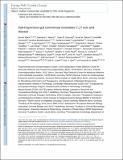Salt-responsive gut commensal modulates TH17 axis and disease
Author(s)
Matus Garcia, Mariana Guadalupe; Kearney, Sean M; Olesen, Scott Wilder; Alm, Eric J
Downloademss-74468.pdf (4.982Mb)
PUBLISHER_POLICY
Publisher Policy
Article is made available in accordance with the publisher's policy and may be subject to US copyright law. Please refer to the publisher's site for terms of use.
Terms of use
Metadata
Show full item recordAbstract
A Western lifestyle with high salt consumption can lead to hypertension and cardiovascular disease. High salt may additionally drive autoimmunity by inducing T helper 17 (T(H)17) cells, which can also contribute to hypertension. Induction of T(H)17 cells depends on gut microbiota; however, the effect of salt on the gut microbiome is unknown. Here we show that high salt intake affects the gut microbiome in mice, particularly by depleting Lactobacillus murinus. Consequently, treatment of mice with L. murinus prevented salt-induced aggravation of actively induced experimental autoimmune encephalomyelitis and salt-sensitive hypertension by modulating T(H)17 cells. In line with these findings, a moderate high-salt challenge in a pilot study in humans reduced intestinal survival of Lactobacillus spp., increased T(H)17 cells and increased blood pressure. Our results connect high salt intake to the gut-immune axis and highlight the gut microbiome as a potential therapeutic target to counteract salt-sensitive conditions.
Date issued
2017-11Department
Massachusetts Institute of Technology. Center for Microbiome Informatics and Therapeutics; Massachusetts Institute of Technology. Center for Biological & Computational Learning; Massachusetts Institute of Technology. Department of Biological EngineeringJournal
Nature
Publisher
Springer Nature
Citation
Wilck, Nicola et al. “Salt-Responsive Gut Commensal Modulates TH17 Axis and Disease.” Nature 551 (November 2017): 585-589 © 2017 Macmillan Publishers Limited, part of Springer Nature
Version: Author's final manuscript
ISSN
0028-0836
1476-4687